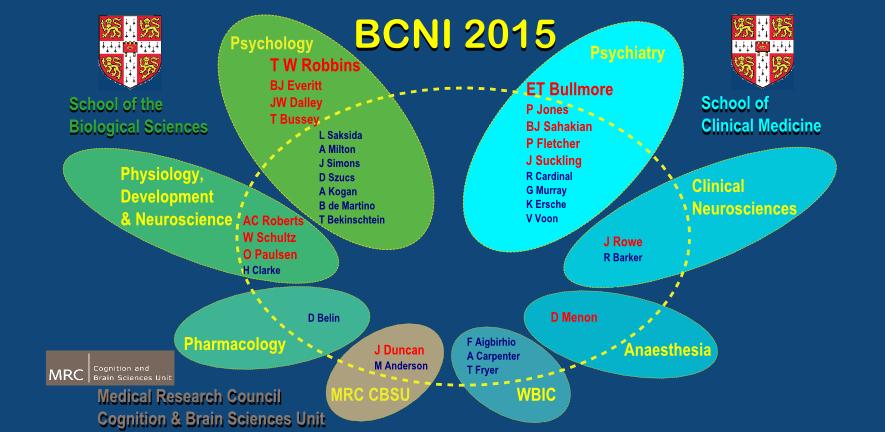Professor Trevor Williams Robbins (CBE FRS FMedSci) is a former Head of the Department of Psychology, University of Cambridge, a recipient of many contribution awards, and one of the most influential brain scientists of the modern era (1, 2). Professor Robbins is an Emeritus Fellow of Downing College, where he formerly held the Angharad Dodds John Fellowship in Mental Health and Neuropsychiatry.
In 1997, Trevor Robbins became the first academic in Cambridge to be appointed as a Professor of Cognitive Neuroscience, retaining this position as Emeritus Professor today. He was Chair of Experimental Psychology and Head of the Department from 2002 to 2017.
For over 10 years Professor Robbins was director of the Behavioural and Clinical Neuroscience Institute, - a collaborative project involving different Schools and multiple Departments within the University of Cambridge funded between 2003 and 2015. The extensive work of the Institute renders publications to this day. See Research below for more.
In February 2024, the Department of Psychology launched a new communal space for psychophysiological research, - a common experimental area named after Professor Robbins to commemorate his academic legacy of promoting inter-school collaboration and translational science. For more visit Trevor Robbins Cognitive Neuroscience Laboratories.
Biography
In 2025, Trevor Robbins is still continuing his academic work.
His lifetime track record includes multiple memberships, presidencies, and awards.
Professor Robbins was President of the European Behavioural Pharmacology Society from 1992 to 1994. A year later, in 1995 he chaired Neurosciences and Mental Health Board for the Medical Research Council and remained in this position until 1999.
From 1996 to 1997, Trevor Robbins was President of the British Association of Psychopharmacology.
2002 through to 2017, Professor Robbins was Chair of Experimental Psychology and Head of the Department of Psychology at the University of Cambridge.
In 2003, Trevor became Director of Behavioural and Clinical Neuroscience Institute, University of Cambridge, which continued to be funded until 2015.
See the full list of Prof Robbins’ appointments and awards below:
1980 – joined the editorial board of Psychopharmacology
1990 – appointed Fellow of the British Psychological Society
1995 – joined the Medical Research Council
1997 – appointed Professor of Cognitive Neuroscience at the University of Cambridge
2000 – received the inaugural Distinguished Scientific Contribution Award from European Behavioural Society
2000 – joined the Academy of Medical Sciences
2001 – received the inaugural Distinguished Scientist Award from EBPhS
2003 – joined the editorial board of Science
2005 – joined the Royal Society
2005 – received IPSEN Foundation Neuroplasticity prize
2011 – received the Distinguished Scientific Contributions Award from the American Psychological Association (jointly with B.J.Everitt)
2012 – appointed Commander of the Order of the British Empire for services to medical research
2014 – received the Grete Lundbeck European Brain Research Prize for outstanding contributions to European neuroscience (jointly with S.Dehaene and G. Rizzolatti)
2015 – received the Robert Sommer Award for research in schizophrenia (jointly with BJ Sahakian)
2016 – received the Lifetime Achievement Award of the British Association for Psychopharmacology
2017 – received the Gold Medal from the Society of Biological Psychiatry
2017 – received the Patricia Goldman-Rakic Award for Cognitive Neuroscience
2017 – joined British Pharmacological Society
2018 – appointed Honorary Professor at Fudan University, Shanghai
2021 – received the William James Fellowship Award of the Association of Psychological Science
Professor TW Robbins has been included on a list of the 100 most cited neuroscientists by the Institute for Scientific Information, has published nearly 1000 full papers in scientific journals and has co-edited 10 books:
-
Psychology for Medicine (1988);
-
The Prefrontal Cortex: Executive and Cognitive Functions (1998);
-
Disorders of Brain and Mind, Volume 2 (2003);
-
Drugs and the Future (2006);
-
The Neurobiology of Addiction (2010);
-
Decision-Making, Affect and Learning: Attention and Performance (2011);
-
Cognitive Search: Evolution, Algorithms, and the Brain (2012);
-
Translational Neuropsychopharmacology (2016);
-
The Neurobiology and Treatment of OCD: Accelerating Progress (2021);
-
The Frontal Cortex: Organization, Networks, and Function (2024).
Trevor was recently ranked as "the 4th most influential brain scientist of the modern era" by Semantic Scholar and recently topped world-wide as well as national lists for both Psychology and Neuroscience according to the 3rd edition of Research.com ranking.
In 2024, the Department of Psychology, University of Cambridge named a new common experimental area after Trevor Robbins. The space (TRCNLabs) promotes collaborative culture in academia and provides Department’s students and other members with facilities and equipment for psychophysiological research.
Research
Professor Trevor Robbins works in the areas of cognitive and behavioural neuroscience, with a special emphasis on psychopharmacology. He is particularly interested in the functions of the frontal lobes of the brain and their connections with other regions, including the so-called brain reward systems in the striatum and the limbic system. These brain systems are relevant to such neuropsychiatric and neurological disorders as Parkinson's and Huntington's diseases, frontal dementia, schizophrenia, depression, drug addiction, obsessive-compulsive disorder and attention deficit/hyperactivity disorder, as well as frontal lobe injury. Professor Robbins uses a variety of techniques ranging from the co-invented computerized neuropsychological test battery (‘CANTAB’) for assessing cognition in patients to functional brain imaging and molecular neuropharmacology. His work seeks to translate basic neuroscience findings into clinical application, specifically the diagnosis and treatment of neuropsychiatric and neurological disorders. Two particular current interests are characterising beneficial effects of drugs on cognition, as may occur with 'cognitive enhancing' drugs used clinically, and deleterious effects of drugs of abuse, such as cocaine and amphetamine.
Trevor is continuing to guide individual students and researchers.
For over 10 years, Prof Robbins directed the Behavioural and Clinical Neuroscience Institute. Since BCNI inception in 2003, the work by the affiliated members resulted in over 1000 publications in peer-reviewed scientific journals. BCNI projects still generate outputs today. Since the funding of the Institute stopped, the BCNI quarters are an open experimental area: members of the Department are welcome to book the testing suites for their data collection.
The Behavioural and Clinical Neuroscience Institute
The BCNI was originally funded as an MRC Centre on a development grant in 2003, before receiving full, 10 year joint funding from the MRC and Strategic Award from Wellcome Trust (2005-2015). The Director was Professor TW Robbins and the Clinical Director, Prof. ET Bullmore. The University supported the establishment of the BCNI on the Downing Site in refurbished premises. The mission of the BCNI was to inter-relate basic and clinical research in psychiatry and neurology. It brought together Cambridge's geographically distributed strengths in basic and clinical neuroscience to optimise translational impact on a range of neurological and psychiatric disorders including addiction, depression, schizophrenia, OCD, ADHD, Parkinson's and Alzheimer's diseases, as well as brain injury. The BCNI comprised about 200 neuroscientists (including PhD students funded by the MRC and elsewhere, as well as post-docs) from several departments in the School of Biological Sciences, especially Psychology and the Clinical School, especially Psychiatry. A diagram of some of the main principal scientific membership is shown below.
The main research themes of the BCNI were as follows:
Translation – of cognitive neuroscientific concepts both across species, and from healthy to disordered groups, supported by core animal research and neuroimaging infrastructure.
Traits –delineation of neurocognitive traits cutting across traditional diagnostic boundaries in neuropsychiatry – e.g., the trait of impulsivity which transcends both addiction and ADHD - and intermediate endophenotypes – e.g. brain functional and cognitive markers mediating heritable risk for neuropsychiatric disorders facilitating the search for genetic factors.
Treatments – proactively developing methodology and expertise for innovative preclinical and experimental medicine studies of tool compounds; working in partnership with industry for neurocognitive characterization of specific drug targets and early-stage new drug development
Training – increasing the scope and scale of postgraduate training options by creating an expanded 3 year PhD programme in translational neuroscience for BCNI-affiliated PhD students and by setting up a 1 year MPhil course
Overall, BCNI has a thriving record of not only publishing research articles and reviews but also media and public engagement, as well as outreach.
See the running document of the ongoing publications here.
Publications
Most prominent publications shortlisted to date (2025) include
Aron, A.R., Fletcher, P.C., Bullmore, E.T., Sahakian, B.J. & Robbins, T.W. (2003) Stop-signal inhibition disrupted by damage to right inferior frontal gyrus in humans. Nature Neuroscience, 6, 115-116.
Clarke, H.F., Dalley, J.W., Crofts, H.S., Robbins, T.W. & Roberts, A.C. (2004) Cognitive inflexibility after prefrontal serotonin depletion. Science, 304, 878-880.
Everitt, B.J. & Robbins, T.W. (2005) Neural systems of reinforcement for drug addiction: from actions to habits to compulsion. Nature Neuroscience, 8, 1481-1489.
Dalley, J.W., Fryer, T.D., Brichard, L., Robinson, E.S.J., Theobald, D.E.H., Lääne, K., Peña, Y., Murphy, E.R., Shah, Y., Probst, K., Abakumova, I., Aigbirhio, F.I., Richards, H.K., Hong, Y., Baron, J.C., Everitt, B.J., Robbins, T.W. (2007) Nucleus accumbens D2/3 receptors predict trait impulsivity and cocaine reinforcement. Science, 315, 1267-1270.
Belin, D., Mar, A.C., Dalley, J.W., Robbins, T.W. & Everitt, B.J. (2008) High impulsivity predicts the switch to compulsive cocaine-taking. Science, 320, 1352-1355.
Crockett, M.J., Clark, L., Tabibnia, G., Lieberman, M.D. & Robbins, T.W. (2008) Serotonin modulates behavioural reactions to unfairness. Science, 320, 1739.
Chamberlain, S.R., Menzies, L., Hampshire, A., Suckling, J., Fineberg, N.A., del Campo, N., Aitken, M.R.F., Craig, K., Owen, A.M., Bullmore, E.T., Robbins, T.W. & Sahakian, B.J. (2008) Orbitofrontal dysfunction in patients with obsessive-compulsive disorder and their unaffected relatives. Science, 321, 421-422
Ersche, K.D., Jones, P.S., Williams, G.B., Turton, A.J., Robbins, T.W. & Bullmore, E.T. (2012) Abnormal brain structure implicated in stimulant drug addiction. Science, 335, 601-604.
Bari, A. & Robbins, T.W. (2013) Inhibition and impulsivity: behavioral and neural basis of response control. Progress in Neurobiology, 108, 44-79.
Ersche KD, Gillan CM, Jones PS, Williams GB, Ward LH, Luijten M, de Wit S, Sahakian BJ, Bullmore ET, Robbins TW. (2016) Carrots and sticks fail to change behavior in cocaine addiction. Science, 352(6292), 1468-71.
Vaghi MM, Vértes PE, Kitzbichler MG, Apergis-Schoute AM, van der Flier FE, Fineberg NA, Sule A, Zaman R, Voon V, Kundu P, Bullmore ET, Robbins TW. (2017) Specific Frontostriatal Circuits for Impaired Cognitive Flexibility and Goal-Directed Planning in Obsessive-Compulsive Disorder: Evidence From Resting-State Functional Connectivity. Biol Psychiatry, 81(8), 708-717.
Friedman NP, Robbins TW. (2022) The role of prefrontal cortex in cognitive control and executive function. Neuropsychopharmacology. 47, 72-89.
Langley C, Sahakian BJ, Robbins TW (2023) Cambridge Neuropsychological Test Automated Battery (CANTAB). Chapter 28 in The Sage Handbook of Clinical Neuropsychology pp435-468 Sage, Los Angeles, London ISBN 978-15297-1776-1
Biria M, Banca P, Healy MP, Keser E, Sawiak SJ, Rodgers CT, Rua C, de Souza AMFLP, Marzuki AA, Sule A, Ersche KD, Robbins TW. (2023) Cortical glutamate and GABA are related to compulsive behaviour in individuals with obsessive compulsive disorder and healthy controls. Nat Commun. 14, 3324.
Robbins TW, Banca P, Belin D. From compulsivity to compulsion: the neural basis of compulsive disorders. (2024) Nat Rev Neurosci. 25, 313-333.
For exhaustive list see Google Scholar or PubMed


